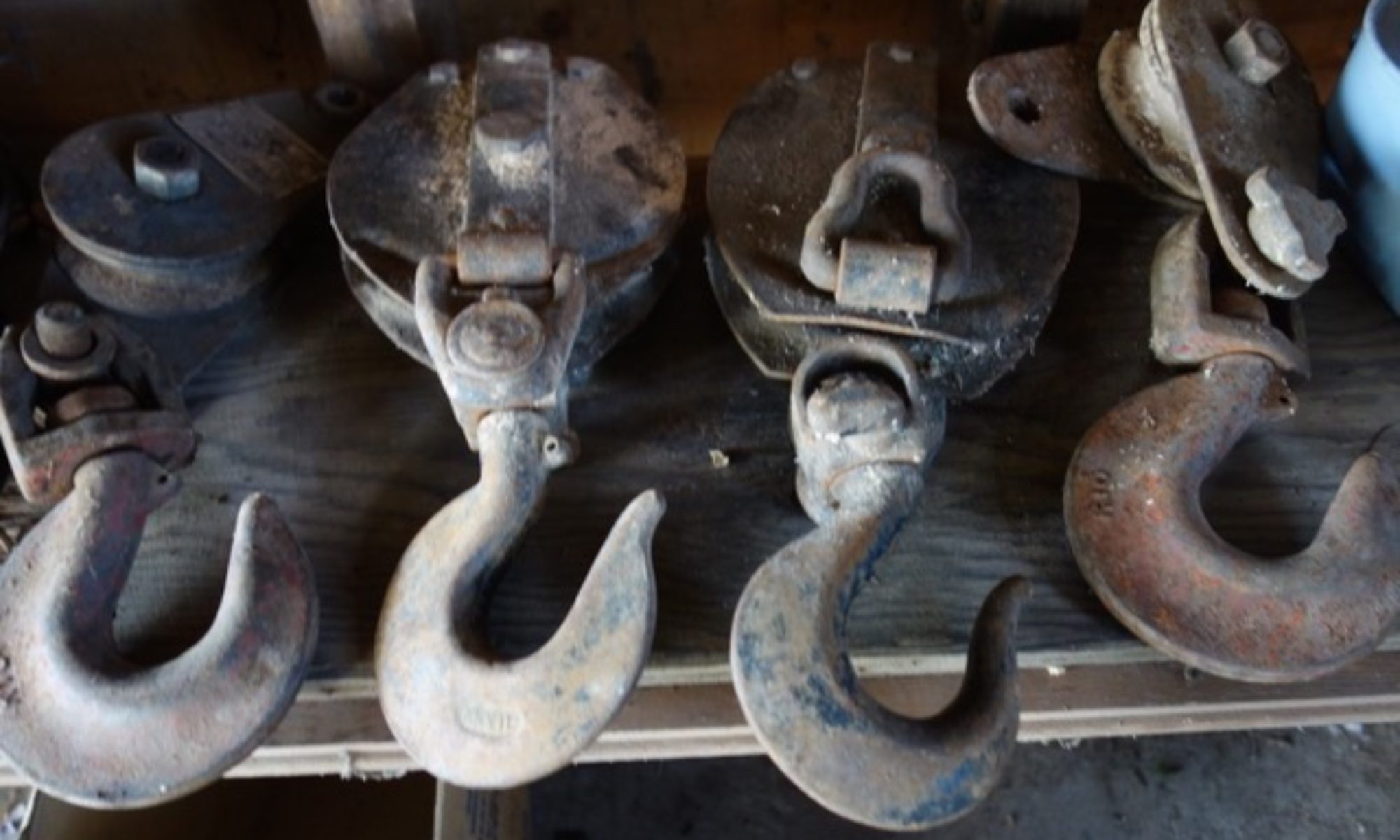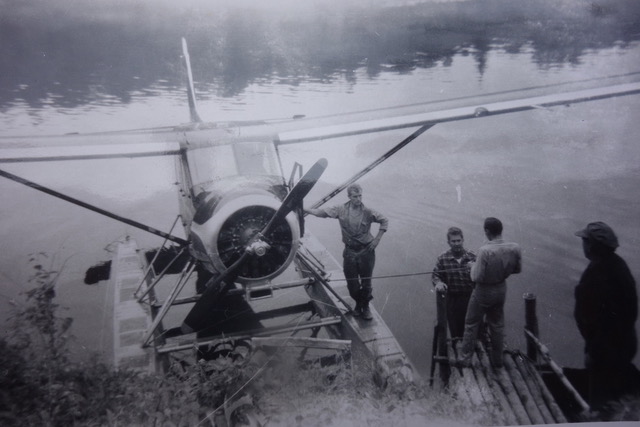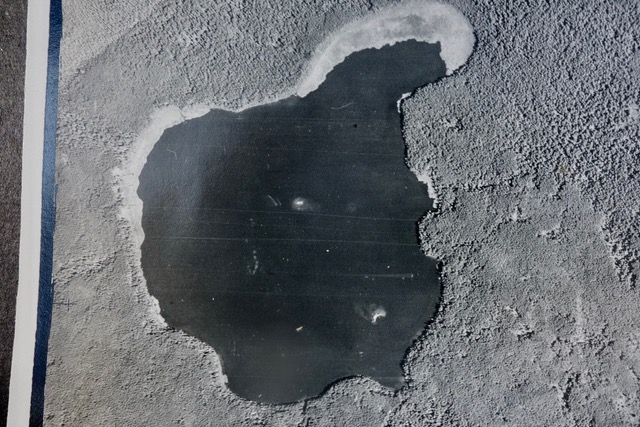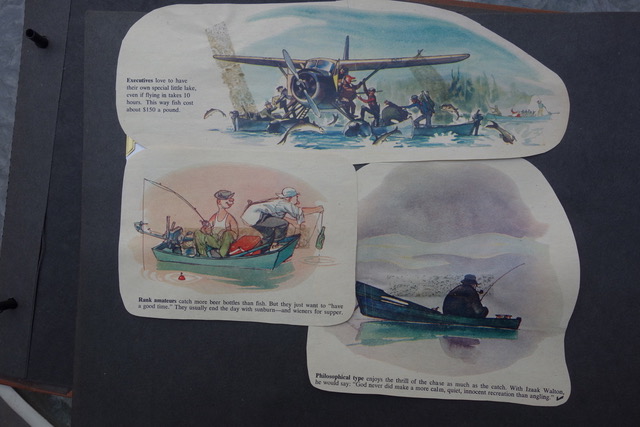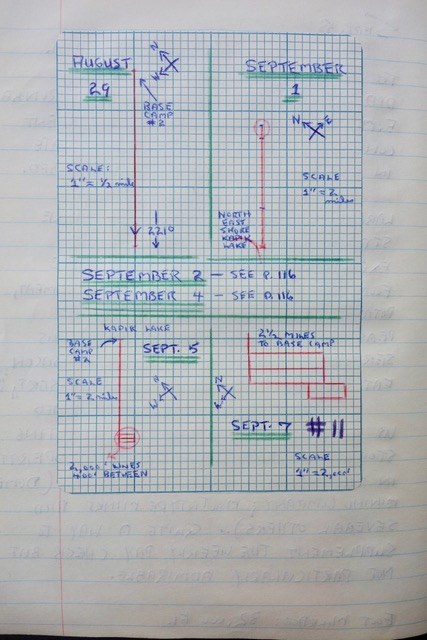Note: The end of these “worst job” stories is coming soon…i.e. part 7…wanted to get the
stories in print even if most readers were not interested. Provides a distraction from
the terror of Ukraine and the madman Putin.
EPISODE 557 PART 6 AUGUST 27 TO SEPT 6, 1958 WORST JOB I EVER HAD
alan skeoch
March 18,2022
DEAR DIARY

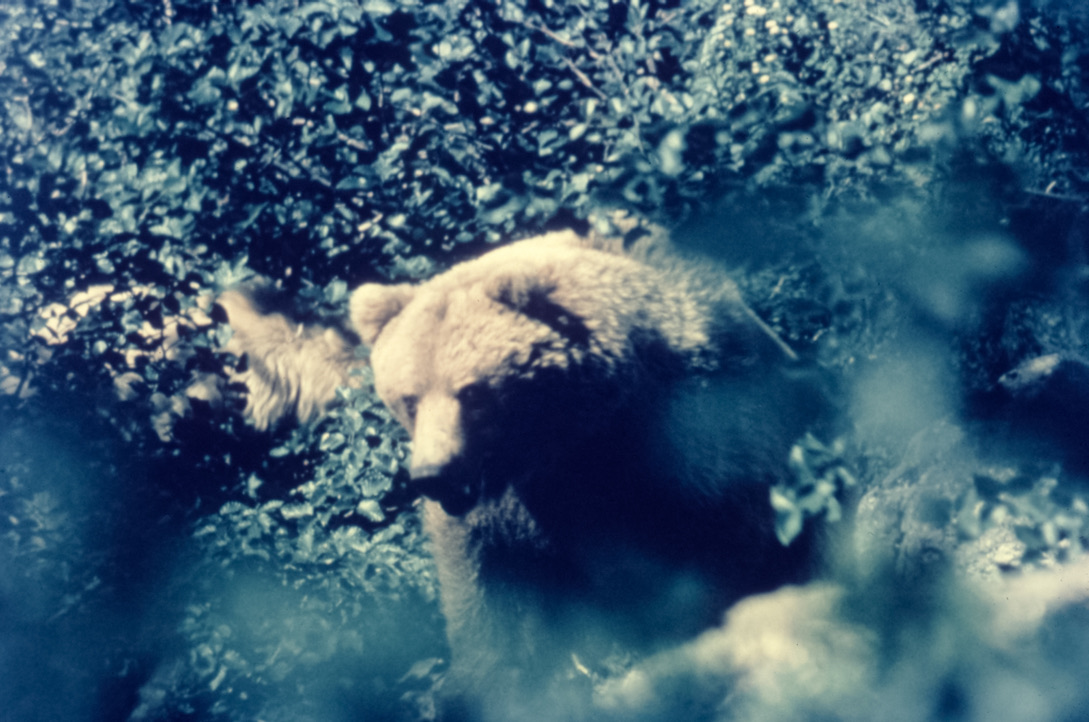
THIS bear picture was taken on the Yukon or Alaska job. It highlights how we did not want to meet bears…i.e. close quarters. If we made lots of
noise the bears were not a problem. These are Grizzly bears. One of which had to be shot by a armed officer. The bear of the Groundhog river was a Black Bear. He got too close
for comfort one evening. (see below) He was not shot. We were unarmed on all except for one job in 10 years.
August 27, 1958I woke late tonight with a funny feeling. Did not know why for a few moments. Admired how the moon lit up the inside of our tent. Then a cloud passed byblotting out the moon. Only it was not a cloud. it was the bear…he was on the other side of the tent wall…maybe three feet from my body encasedin my sleeping bag. His shadow blotted out the moonlight. I held my breath. Then his shadow just moved down the tent wall and out of ourlives. He stole no food that night. Probably he could smell us and I am told bears do not like the smell of human beings. Our smell was particularlystrong that night.
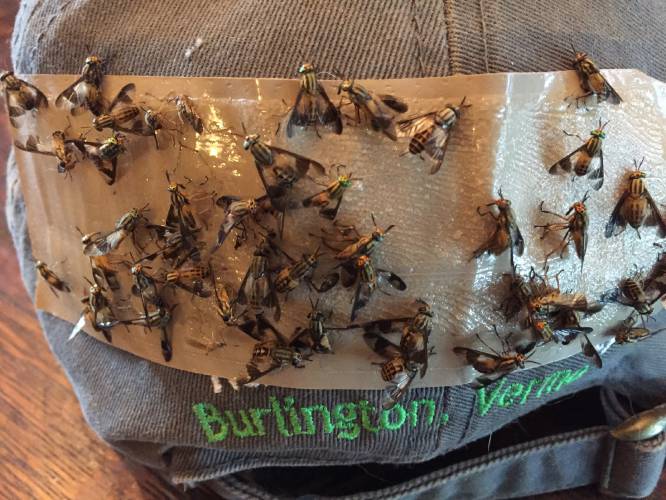

This is an example of deer flies in action. They can be terrible. Drive animals out of the forest into the lakes. The phenomena
I noticed where a thousand (guess) deer flies wedged themselves into a ball under our dock is not mentioned in deer fly
behaviour. At least not that I can find. They all appeared to die in the cluster. I do not know why.
In the morning we tore apart Base Camp #1 and packed everything on the dock and shoreline. Late in the afternoon the Beaver float plane arrived and wasloaded for the short hop to Kapik Lake a few miles to the west where we set up our new Base Camp. What a difference. The new camp is nestled in a climax forestof birch and poplar trees high on a hill where fresh wind blows. Not so many flies resulted. We were out of the swamps.A strange thing happened the day we left Base Camp #1.. Something not really relevant but strange all the same. Our makeshift dock began to attract great clouds ofdeer flies. Deer flies are nasty creatures that like human flesh and human blood. Chevrons on their wings. They had been torturing us every day since our arrival. Yet thisday, August 27, 1958, they were not biting. Instead they were clustering in pods under the dock. Wedging themselves into a great pack of their brethrenand dying all pressed together. Hundreds of them, maybe a thousand. Made no sense but it is a clear unusual memory. We did not try to dissuade them from this mass suicide.
MACK DEISERT ARRIVES…ONE TOUGH HOMBRE
Our new fourth man was Mack Deisert standing on the pontoon while the pilot clears up a few details, perhaps related to money.Mac was quite an entrepreneur. No fucking around with him.Mac arrived just as we were moving to Kapik Lake with all our gear…August 27, 1958
We had a new employee arrive to replace Robert Hopkins. Mack Deisert is a tough man who is familiar with bush life. Also an expert on heavy mining tools. For a time he worked undergroundin the gold mines of Timmins. Why he no longer was a full time miner became evident as we talked around the camp fires. “There were all kinds of ways tohigh grade gold from the Timmins mines. Lunch pails worked for a while but stealing gold that way was a little too obvious…small amounts under fingernails or in false teeth speciallymade by local dentists. Some gold was smuggled out in shoe heels…sounds stupid I know but remember just an ounce of gold was worth money…high graders got 50% of the face value of gold. Lots of buyers in Timmins. A miner or a shift boss sees a streak of raw goldin a hunk of rock…not common but occasionally appears…he slips a chunk in his pocket then gets to a place where he hammers the chunk and get smaller piece with more gold…then has to figure how toget it out. A wink to a foreman might do it. Most of the high grade gold is ground down right in the mine. A miner comes upon a vein with raw gold… he just chips out a chunkknocks of the crap and keeps a bit of gold for himself. Small pieces are easy to hide. Think ‘body cavity’. Some say millions worth of high grade gold hidden and sold in Timmins. Miners today are checked by security guysevery shift. Big signs in the mine condemn high graders. Those signs would not be up if there was not a problem. Illegal gold…common knowledge aboutwho to contact.” Mack seemed to know a lot about high grading gold…maybe he got caught and that was why he took a job with us. Or he was just telling a goodstory around a campfire. Whether his stories were true or not , Mac was certainly an entertaining character.
TIMMINS — LOTS OF GOLD HIGH GRADERS WITH INGENUITY


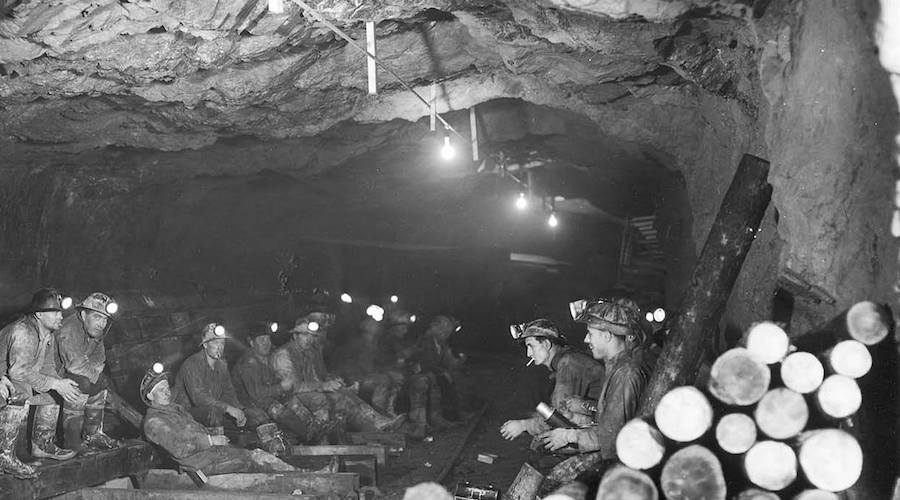 www.mining.com/wp-content/uploads/2017/12/19574967_10155257983451578_8225746921495811735_o-1-300×167.jpg 300w, www.mining.com/wp-content/uploads/2017/12/19574967_10155257983451578_8225746921495811735_o-1-768×427.jpg 768w” sizes=”(max-width: 900px) 100vw, 900px” apple-inline=”yes” id=”9F3864C6-6778-414E-AC10-007AAE1F4EB4″ src=”http://alanskeoch.ca/wp-content/uploads/2022/03/19574967_10155257983451578_8225746921495811735_o-1.jpg”>
www.mining.com/wp-content/uploads/2017/12/19574967_10155257983451578_8225746921495811735_o-1-300×167.jpg 300w, www.mining.com/wp-content/uploads/2017/12/19574967_10155257983451578_8225746921495811735_o-1-768×427.jpg 768w” sizes=”(max-width: 900px) 100vw, 900px” apple-inline=”yes” id=”9F3864C6-6778-414E-AC10-007AAE1F4EB4″ src=”http://alanskeoch.ca/wp-content/uploads/2022/03/19574967_10155257983451578_8225746921495811735_o-1.jpg”>These miners celebrated with special cake when Porcupine Gold Mines ‘Dome” mine closed on December 31, 2017, after 107 years. A nearby
mine at South Porcupine opened in 1910 and produced an estimated 67 million ounces of gold. That does not include the
gold that was ‘high graded’ and sold to criminal buyers for $12.50 an ounce in the 1950’s. Today, 2022, gold sells for $2,000
an ounce. I wonder what the high graders get today. Just to test your criminal minds think how you could sneak an
ounce of raw gold out of a Timmins gold mine. Not too easy today…body checks.
MACLEAN’S MAGAZINE, 1950 “FIRE A SHOTGUN DOWN TIMMINS MAIND STREET…YOU WILL HIT HALF A DOZN HIGHGRADERS”
“Ontario mines lose a million dollars a year to high-graders. Quebec and B. C. mines are robbed of another million. (One B. C. high-grader was stopped at the Blaine, Washington, custom station carrying $55,000 in a single shipment.) But police cases in recent years have amounted only to the apprehension of individual miners with small quantities of illegal gold. Yet, as one mining official said recently, “Fire a shotgun down the main street of Timmins or Val d’Or and it’s even odds you’ll hit half a dozen highgraders.”
“Men like these bring gold out of the mines by the use of every stratagem human ingenuity can devise. It is carried in specially built false teeth, in false bottoms of lunch pails, within bars of soap, inside plugs of tobacco and hand-rolled cigarettes and within the body openings. Some simply carry it in their hands, or under their armpits, as they pass through a shower room completely naked, leaving their work clothes on one side and picking up their street clothes on the other. Their lunch pails travel across the change room—commonly called a “dry”—on a conveyor belt subject to police scrutiny.
MACLEAN’S, How Gold Thieves Get Away With Millions, Don Delaplante, July 15, 1950
DEAR DIARY
To Mack Deisert a blazing Axe was child’s play. He was unlikely to hurt himself for he knewthe consequences of a wilderness injury. Mack considered our job an interesting interlude where he could
pick up a few bucks in a week or so. Strong as an ox. Wish he was with us earlier.s
Sometimes posture reveals much about a person. Take a look at Mack leaning against the bush plan.
“I heard you need a man for a week or so? I’m available. If not, I’ll fly back to South Porcupine.”
DEAR DIARY
Supper was special. Fresh food. We dined on veal cutlets, string beans, potatoes, tea and ‘fresh bread’. Our bread was soon stale…turned dryor mouldy…good bread got verycrusty as time wore on in camp. Mouldy bread was garbage. Dry bread was usable even if hard as a gold brick. The way to soften dry bread up
was a French Toast concoction we made regularly…water, powdered milk, a couple ofeggs while they lasted, some butter and a hot frying pan. French toast could be stretched out and become a bush lunch when lathered withpeanut butter. Tasted really good. We could do the same thing with porridge. Hot in the morning. Then a slab of cold porridge oats as a jelly like lunch. How?If firm enough the cold porridge could also be lathered with peanut butter. All this was washed down with tea boiled in afruit can tin with a wire looped over so the billy tin and then hung on a stick over an open fire. When we ran out of real tea we used Labrador tea, alocal plant whose leaves were fuzzy on the bottom. Easy to find. Questionable alternative. No alcohol on the job. Beer would weighfar too much anyway. Although Floyd did sneak a mickey of Scotch which he shared equally as if it was liquid gold.August 28, 1958
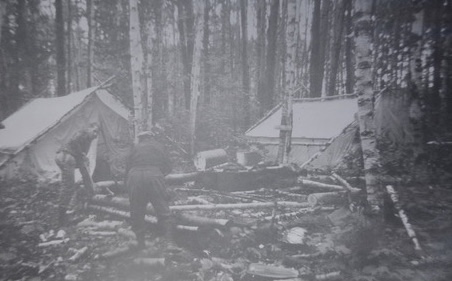
Rain…wonderful rain. So we got a day of rest…well not quite that for we had to get our new campsite ship shape. Two tents put up fast
lest the rain get to our sleeping bags. Then a new feature. We had to cut and split birch firewood as summer was over. Frost on the pumpkin as
they say…frost on the swamp apples is more appropriate.
KAPIK LAKE — Our camp was somewhere here as was the abandoned canoe.
The pilot from Austen Airways had to be careful landing as the lake was small with
islands in he middle.
Kapik Lake is notbig, just enough room for the Beaver to take off and land. We were very surprised to discover other humans had preceded us.
“What’s that over on the other side?” “Looks like a canoe.” Sure enough, someperson had abandoned a canoe on the lake. No sign of a cabin or campsite. We rescued it. complete withpaddles and had transportation for leisure evenings to tour the little lake. Maybe this was here for fly in fishermen. Maybe Kapik Lakewas full of fish. Little good that would do us for we had no fishing gear.Kapik Lake was inhabited by some strange mole like creatures on one of the little islands and a family of Loonswho serenaded us regularly.Maybe Kapik Lake was one of those fly in fishing lakes that rich people use which came complete with a cook to fry upwhatever they catch. Our use of the lake was far less fancy. Rich fishermen, if hey arrived while we were there, would havebeen flabbergasted at our basic diet of porridge. I cut these cartoons our of a local paper after the job was over. Mademe laugh.Walt put the tea bags in with our pork and beans tonight which gave us all a good laugh. Then Walt asked “Do you want toto know how to speak Eskimo (Inuit is term today)?” and proceeded to teach us the language which I think he made up as he went along. Then againhe did work as a diamond driller at Rankin Inlet.August 29, 1958Walt and I cut line south 221 degrees. Easy work this time because the big trees shaded out the brush. What a luxury…we could slap ouraxes on one side of a big poplar then the other and move by easy line of sight. Summer was over suddenly and the trees were changing colourThe bush forest was becoming a land of red and gold. The negative side of this season change was the arrival of cold weather. All summerwe had been complaining about the hot sweaty days. Now we complained about the cold. Bonus was big time. Far lfewer flies…none at times.Distance covered 12,000 feet (easy day)August 30, 1958Rain again. Spent most of the day in our sleeping bags. I planned my short term future. University bound. Thoughts of the University of Toronto mademe very nervous. Dad was a tire builder and mom was a seamstress. Most my other relatives were farmers. So the prospect of a university educationwas novel and made me nervous not that I told anyone. My good friends Russ and Jim would be doing the same thing and were probably nervous as well.Money made on this job would pay my first year fees of $400. Some friends wondered why I took the job. Two answers. First, because I loved the job.
Second, to pay university fees of $400 per year as non resident “city boy”.
Our radio weather report warned of heavy frost tonight so we started to assemble our new air-tite wood stove. The hole in the tent left by the bear was the exitpoint for the stovepipe. The big birch trees in this climax forests means we have lots of excellent firewood that splits with ease. Comfort! And the smellof the wood stove is like the best perfume imaginable.The only bad news today was that our fresh meat had already gone bad. It would not pass the nose test.September 1, 1958Cold … really cold all day. Just above freezing which meant the raindrops on the forest leaves were like little ice daggers penetrating our clothes.Wespent the day extending Bob And Mack’s trail to the northern anomaly.Distance covered 33,000 feetSeptember 2, 1958Another long hard 12 hour day. We finished blazing our trail to where we figured the anomaly was located then did the survey with the Ronka and magnetometer.My gum rubber boots have holes big enough for my socks to poke through which means I am working every day in wet feet. Each night we pull off our bootsand peel down the wet socks then massage our feet. Bad feet would mean no work.Distance covered” 37,000 feet (about 7 miles)September 3, 1958Another brute of a storm night and day. The tent is billowing in the wind like a great hot air balloon.September 4, 1958Bob and I finished the north anomaly with both the Ronka EM unit and the magnetometer.In the evening Walt and I stalked a crane in the shallows of Kapik Lake then stayed out on the lake to watch the sun set. Magnificent.Distance covered 33,000 feetSeptember 5, 1958We finished cutting trail to south anomaly then did reconnaissance survey with the Ronka EM unit and the magnetometer. No conductorwas discovered.Well, we are in food trouble. All our staple foods have been consumed…bread, meat, potatoes, fruit and butter. So we have to make do withwhat we can concoct which tonight constituted a can of peas and carrots, big pile of rice topped with bacon fat gravy and followed by cookiesfor dessert.Mack and Walt really entertained us with fascinating stories of the ‘high graders’ operating in the Timmins gold mines…Dome MinE Company and MacIntyre Mines, etc.Distance covered 32,000 feetSeptember 6, 1958Stayed awake all night as lightning flashes and thunder made sleep difficult. Very dramatic. We kept the wood fire burning most of the night and as a resultfelt really cosy in our tent. In the morning I began packing my rucksack for the job is nearly over. Trans Canada Airline has Viscount air service to Toronto whichsounds exciting. This was my last day as cook so I made a large stew of whatever odds and ends I could find including the bacon rind on our slab of porksowbelly. Not such a bad dinner. To give it a little more body I slipped in a cupful of rolled oats. Inventive.
END EPISODE 556 .. PART 7 AUGUST 27, TO SEPT. 6, 1958 WORST JOB I EVER HAD
NEXT EPISODE PART 8 TRAGEDY AND ESCAPE FROM WORST JOB I EVER HAD
